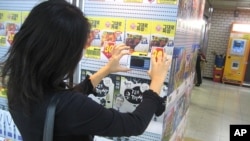According to international studies of worker productivity, South Koreans spend more hours on the job than workers in many other countries.
That means many find it hard to make time for even the most basic of chores, like grocery shopping. In Seoul, a Korean supermarket chain has developed a "virtual" store that allows consumers to do their shopping with smartphones.
Kim Yoona stands on the subway platform inside Seoul’s Seolleung station. All along the track are illuminated billboards with hundreds of pictures of food products, including instant noodles, bottled beverages and bunches of bananas.
This is a virtual store, created by the supermarket chain Homeplus, an affiliate of British firm Tesco.
Homeplus video about its virtual grocery store
Kim, 25, has downloaded the Home plus application onto her smartphone. She wants to give the virtual store a try.
“I’m thinking of buying the Maxin Mocha Gold Might, an instant coffee mix," she says. " In this virtual store, they have one, two, three, four, five, six kinds of coffee mix lines. Because Maxin is my favorite, I will buy this.”
Kim holds her smartphone over the black and white Quick Response Code (QR) under the picture of the coffee mix.
“I am scanning the QR code now,” she explains.
The product appears on her phone’s screen and she selects the size of the bag of mix she wants.
“It says it’s on my cart now,” Kim announces.
The App then asks Kim where and when she would like her coffee mix delivered and then prompts her to enter billing information. The product is then delivered shortly after she arrives home.
Homeplus representative, Jo Hyun Jae, says consumers like Kim are exactly who the virtual store was designed for.
He says Koreans in their 20s and 30s already rely on smartphones to complete many routine tasks. And due to long hours at school or work, they are always on the move.
Jo says Home plus customers are really busy and many do not have the time to go to the supermarket to do their shopping. He says the virtual store allows them to save time.
Jo adds that the virtual store has earned about $11,000 in weekly sales since opening.
There are plans to create more of them in other subway and bus stations, especially in areas close to universities.
Jo says it may only be a matter of time before Tesco starts creating virtual stores for its franchises in other countries too.
He says Homeplus believes this concept can work outside of Korea because many young people around the world are adopting smart phone technology.
But some analysts say the appeal of virtual stores may be limited to Korean consumers.
Kwon Ki-Duk, an IT analyst at the Samsung Economic Research Institute in Seoul, says it is a unique characteristic of Korean people to quickly rotate their tech products.
They have a fascination with the new and abandon what is considered old or out-of-date, she says, adding that they throw those things away. Koreans are really interested in converging and cramming many different functions into a single gadget and mixing technologies to find novel ways to complete ordinary tasks, says Kwon.
While the virtual store is appealing to tech-savvy Koreans, most, including herself, are not ready to give up going to traditional supermarkets just yet, she says. Going to a real mall is one way many Koreans relax when they do have time off from their busy schedules.




